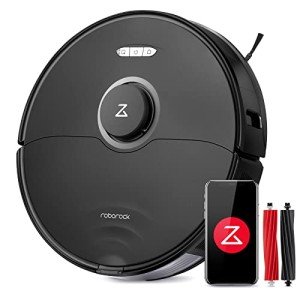10 Great Books On Robot Sweeper

The Rise of Robot Sweepers: Revolutionizing Household Cleaning
In the busy world of innovation, robotic appliances have actually become important companions in the mission for a cleaner home. Amongst these technological marvels, robot sweepers have actually gotten substantial appeal due to their capability to carry out cleaning tasks effectively while decreasing human effort. This post explores the intricacies of robot sweepers, their benefits, running mechanisms, and their future in home cleaning.
What Are Robot Sweepers?
Robot sweepers, frequently described as robotic vacuum cleaners, are autonomous gadgets developed to clean floorings with very little human intervention. Equipped with different sensing units, brushes, and suction abilities, these smart devices browse through living spaces, selecting up dust, dirt, and particles effectively. They are available in various sizes and shapes, accommodating different cleaning requirements and floor types.
Secret Features of Robot Sweepers
Smart Navigation Systems:
- Many robot sweepers use sophisticated navigation systems such as LIDAR or camera-based mapping to create an in-depth map of the area they clean. These systems help them navigate effectively and avoid barriers.
Scheduled Cleaning:
- Users can often set robot sweepers to operate at particular times, making it simple to preserve a clean home without manual intervention.
Sensing units and Detectors:
- Robot sweepers are equipped with sensing units that enable them to detect dirtier areas and change their cleaning intensity appropriately. Some designs can even recognize stairs and ledges to avoid falling.
Compatibility with Smart Home Systems:
- Many robot sweepers can flawlessly incorporate with smart home communities, enabling voice command functionalities and remote control through smartphone apps.
Benefits of Using Robot Sweepers
Robot sweepers provide many advantages that make them appealing to a large range of users:
Time-Saving:
- One of the most significant benefits of robot sweepers is their capability to conserve time. Users can set their devices to clean while they engage in other activities, such as working or investing time with family.
Effective Cleaning:
- With the ability to clean under furnishings and in tight areas, robot sweepers typically reach locations that conventional vacuum can not, ensuring an extensive cleaning experience.
Minimized Physical Labor:
- Robot sweepers decrease the physical needs of cleaning, making them perfect for senior people or those with movement concerns.
Constant Maintenance:
- Regularly scheduled cleansings can promote much better total health and health, especially for individuals with allergic reactions to dust or animal dander.
User-Friendly:
- Generally created for ease of usage, robot sweepers require very little setup and can typically be operated with simply a few taps on a smartphone app.
Table: Comparison of Popular Robot Sweepers
| Model | Smart Navigation | Suction Power | Battery Life | Price (Approx.) | Special Features |
|---|---|---|---|---|---|
| iRobot Roomba 980 | Yes | High | 120 minutes | ₤ 799 | CarpetBoost technology |
| Neato Botvac D7 | Yes | Medium | 120 minutes | ₤ 599 | D-shape style for corners |
| Eufy RoboVac 30C | Basic | Medium | 100 minutes | ₤ 249 | Quiet operation |
| Roborock S6 | Yes | High | 180 minutes | ₤ 649 | Mopping ability |
| Ecovacs Deebot OZMO | Yes | Medium | 110 minutes | ₤ 399 | Smart mopping functions |
How Robot Sweepers Work
Understanding the inner workings of robot sweepers can clarify why they are so reliable. Here's a simplified outline of the procedure:
- Mapping: The robot sweeper starts by scanning the environment to draw up the space using laser sensors or cameras.
- Navigation: Once the location is mapped, the robot uses the data to navigate efficiently, cleaning partial sections before moving on to others.
- Cleaning: Equipped with brushes and suction mechanisms, the robot sweeper collects debris and dirt from floorings.
- Returning Home: Upon completing its task or when the battery is low, the robotic vacuum automatically goes back to its charging dock.
Frequently Asked Questions About Robot Sweepers
1. Can robot sweepers replace standard vacuum?
- While robot sweepers are outstanding for maintaining tidiness and handling light dirt, they may not completely replace conventional vacuums for deep cleaning tasks.
2. How frequently should I run my robot sweeper?
- It is a good idea to run robot sweepers at least twice a week, depending on foot traffic in your home.
3. Are robot sweepers suitable for family pet owners?
- Yes, numerous models are particularly developed for pet hair elimination and function specialized brushes and effective suction alternatives.
4. Do robot sweepers work on carpets?
- The majority of robot sweepers can clean carpets effectively, however suction power and brush style may differ. High-end models typically have settings to adapt to carpeted surfaces.
5. Just how much do robot sweepers cost?
- Costs differ based on functions and brand names, ranging from about ₤ 200 for budget alternatives to over ₤ 900 for high-end models with advanced abilities.
The proliferation of robot sweepers marks a substantial advancement in home cleaning technology. While they may not totally change traditional cleaning techniques, robot sweepers supply unrivaled convenience, performance, and the ability to reduce physical stress on users. As technology advances, these devices are likely to become even smarter, more efficient, and more incorporated with other smart home systems, making them a staple in modern-day households. Eventually, Robot Vacuum Cleaner Sale of robot sweepers is a testament to the evolving landscape of home cleaning options-- one that improves every day life and promotes a cleaner living environment.

